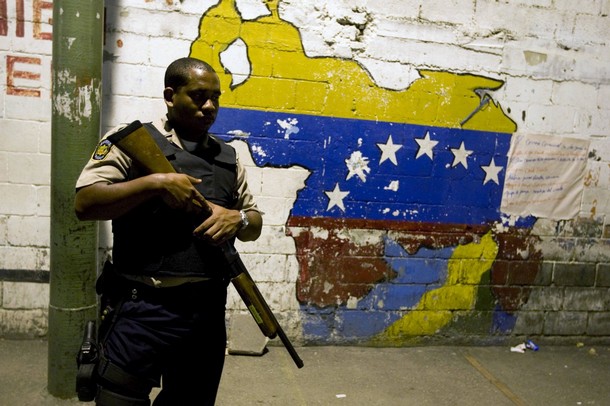a. Nicaragua
b. Mexico
c. Venezuela
d. Jamaica

If you answered "Mexico", you made a very reasonable choice. In the past year, violence has been so rampant there that murder numbers have often exceeded 100 per week. But Mexico does not have the worst problem in the region - that distinction goes to .... Venezuela. Venezuela's rate of 48 violent deaths per 100,000 people is double that of Mexico.
Now, if asked instead to name the top-spot for homicide in all South America, surely drug-crime-ravaged Columbia would come readily to mind. But Venezuela's murder stats soar above Columbia's as well.
Shannon O'Neil - a Fellow at the Council on Foreign Relations - provides some details on the plight of this troubled nation - that sits in a troubled region where murder rates are triple the global average.
According to O'Neil:
- These murders occur mostly at night and spike every two weeks around payday.
- Young people are increasingly the victims, three times more likely to be killed today than 10 years ago.
- Not surprisingly, Venezuelans see crime and public safety as the No. 1 challenge for their country.
Why Venezuela?
O'Neil points out there that there is no single cause, but a convergence of problems that have taken their toll, particularly during Hugo Chávez's tenure over the past decade. Some of it seems related to Chávez's own brand of leadership - openly accusing public figures of criminal activity and condoning violence against anti-government protesters. Loyalty to Chávez trumps the law. Trust in the legitimacy of major state institutions is virtually nonexistent. Other causes include the following:
- Venezuela has become the new "Grand Central" of Andean cocaine traffic, and perhaps even the prime transit point for European shipment.
- Though Chávez replaced local police with a National force, law enforcement still lacks capacity - in skill, personnel or equipment - and often motivation to properly investigate the serious crimes they now face. Officers have no confidence that justice will prevail in the system, and they not uncommonly treat offenders with brutality.
- Policing has also become politicized, with pressure not to lean too heavily on the poor working-class communities. But this creates pervasive disorder.
- The justice system is weak and dysfunctional, undermining the rule of law. Most Venezuelans believe that the police are involved in a lot of the crimes. So - no surprise - crime doesn't even get reported. Courts are perceived as unjust - sentencing only 3 of every hundred murderers.





Comments